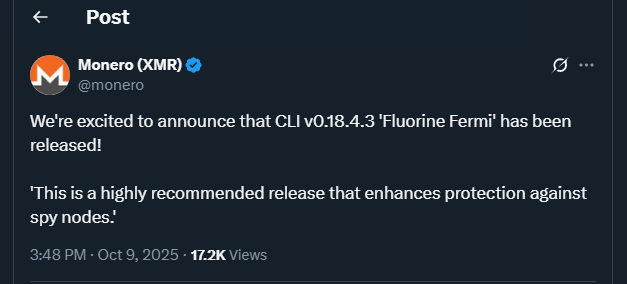TL;DR
- Monero has launched the CLI v0.18.4.3 “Fluorine Fermi” update to strengthen protection against spy nodes that attempt to track user transactions.
- The upgrade introduces a smarter peer selection algorithm that helps avoid large subnet clusters commonly used for surveillance.
- Following the news, Monero’s XMR token surged to a three-week high of $347 before adjusting back below $340, signaling growing market confidence in privacy-focused features.
Monero has released a major update named CLI v0.18.4.3 “Fluorine Fermi”, designed to enhance the blockchain’s defense against malicious spy nodes. These nodes, sometimes organized as botnets or groups, can link IP addresses with transactions, compromising the core principle of untraceable payments. The update adds multiple layers of protection, improving network reliability, user security, and operational efficiency significantly.
Improved Peer Selection Algorithm Protects Users
The Fluorine Fermi update introduces a smarter peer selection system, reducing the likelihood that users connect to multiple nodes within the same IP subnet. This approach targets a common tactic of spy nodes that rely on large clusters of addresses to monitor network activity. By steering users toward safer nodes, Monero strengthens its privacy features while maintaining stable network operations and performance consistency.
Monero already leverages several privacy-enhancing technologies. Every transaction uses a unique stealth address to hide recipients’ real addresses, ring signatures mix real and fake transactions to obscure senders, and Ring Confidential Transactions (RingCT) conceal amounts sent. The community also encourages Dandelion++ software to prevent IP addresses from being traced back to transactions.
Despite these measures, challenges remain. Research on arXiv highlighted the growing presence of non-standard nodes pretending to be legitimate, aimed at monitoring network traffic and threatening privacy. The Fluorine Fermi upgrade mitigates this by discouraging connections to suspicious clusters. It also improves Monero’s mail service, ensuring that transaction data, routing patterns, and message delivery are harder for spies to trace.

Market and Mining Dynamics
The XMR token responded positively to the update, rising to $347 overnight before settling below $340, reflecting investor optimism about reinforced privacy. In parallel, the Qubic mining pool claimed 51% control of Monero’s hashrate, raising theoretical concerns about chain manipulation or double-spending. After recovering from a DDoS attack in August, Qubic now manages a significant portion of Monero mining. Founder Sergey Ivancheglo stated that the goal is to dominate mining operations while limiting competing pools.
With the Fluorine Fermi update, Monero continues to prioritize privacy, addressing longstanding network vulnerabilities while keeping the blockchain resilient, secure, and increasingly user-friendly for all participants.











